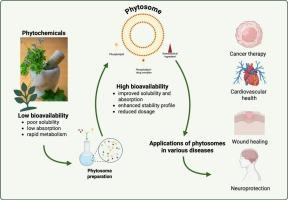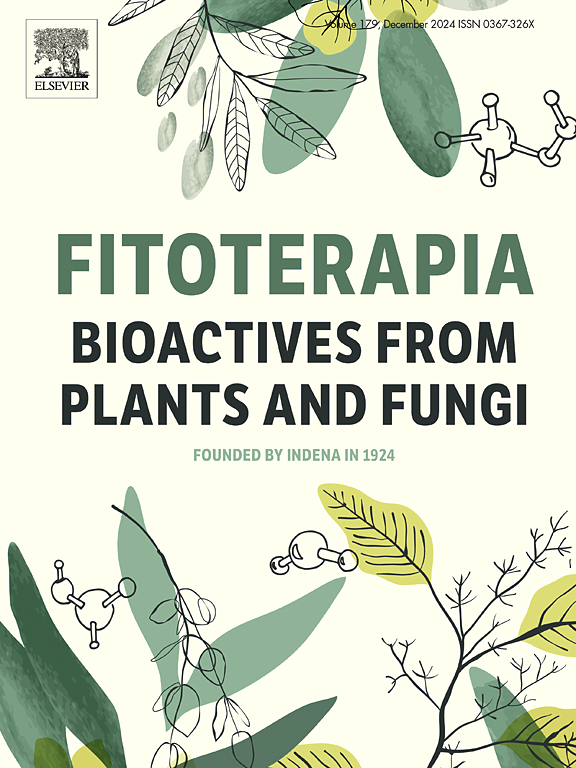靶向药物递送的多酚磷脂体。
IF 2.6
3区 医学
Q3 CHEMISTRY, MEDICINAL
引用次数: 0
摘要
目前,包括类黄酮在内的天然多酚类化合物因其具有明显的抗氧化、抗炎和抗肿瘤特性而引起了研究人员的关注。已经从植物中分离和鉴定了8500多种酚类化合物。尽管它们具有治疗潜力,但临床翻译受到水溶性低、膜渗透性差和广泛的首过代谢的限制,导致生物利用度不理想。本文就植物复合物的形成机制、相对于传统纳米载体的结构优势、对药代动力学和生物功效的影响等方面进行了综述。水飞蓟宾、姜黄素、槲皮素、表没食子儿茶素没食子酸酯(EGCG)和葡萄籽原花青素等多酚类化合物已被成功地配制成叶磷脂体,在临床前和临床研究中均显著提高了口服生物利用度和治疗效果。它还强调了来自临床试验的证据,这些试验涉及各种疾病背景下的植物体制剂,包括癌症、肝脏和代谢紊乱、神经退行性疾病和COVID-19。磷脂体的安全性是有利的,即使在长期使用下,大多数配方也具有良好的耐受性。目前的局限性,包括配方不稳定、缺乏监管透明度和工业规模的挑战,以及靶向给药和联合治疗的未来方向进行了讨论。磷脂小体代表了一个临床可行的平台,将天然产物药理学与现代药物传递技术联系起来,为改善多酚的临床影响提供了可扩展和生物相容性的策略。本文章由计算机程序翻译,如有差异,请以英文原文为准。

Polyphenolic phytosomes for targeted drug delivery
Currently, the attention of researchers is attracted by natural polyphenolic compounds, including flavonoids, which exhibit pronounced antioxidant, anti-inflammatory, and antitumor properties. More than 8500 phenolic compounds have been isolated and characterized from plant sources. Despite their therapeutic potential, clinical translation is limited by low water solubility, poor membrane permeability, and extensive first-pass metabolism, resulting in suboptimal bioavailability.
This review provides a comprehensive analysis of phytosome technology, including the mechanism of complex formation, structural advantages compared to traditional nanocarriers, and its impact on pharmacokinetics and bioefficacy. Polyphenolic compounds, such as silybin, curcumin, quercetin, epigallocatechin gallate (EGCG), and grape seed proanthocyanidins, have been successfully formulated into phytosomes, resulting in a significant enhancement of oral bioavailability and therapeutic efficacy in both preclinical and clinical studies.
It also highlights evidence from clinical trials involving phytosomal formulations in various disease contexts, including cancer, liver and metabolic disorders, neurodegeneration, and COVID-19. The safety profile of phytosomes is favorable, with most formulations well-tolerated even under long-term use.
Current limitations, including formulation instability, lack of regulatory clarity, and challenges in industrial scale-up, are discussed alongside future directions in targeted delivery and combination therapies. Phytosomes represent a clinically viable platform that bridges natural product pharmacology with modern drug delivery technologies, offering a scalable and biocompatible strategy for improving the clinical impact of polyphenols.
求助全文
通过发布文献求助,成功后即可免费获取论文全文。
去求助
来源期刊

Fitoterapia
医学-药学
CiteScore
5.80
自引率
2.90%
发文量
198
审稿时长
1.5 months
期刊介绍:
Fitoterapia is a Journal dedicated to medicinal plants and to bioactive natural products of plant origin. It publishes original contributions in seven major areas:
1. Characterization of active ingredients of medicinal plants
2. Development of standardization method for bioactive plant extracts and natural products
3. Identification of bioactivity in plant extracts
4. Identification of targets and mechanism of activity of plant extracts
5. Production and genomic characterization of medicinal plants biomass
6. Chemistry and biochemistry of bioactive natural products of plant origin
7. Critical reviews of the historical, clinical and legal status of medicinal plants, and accounts on topical issues.
 求助内容:
求助内容: 应助结果提醒方式:
应助结果提醒方式:


